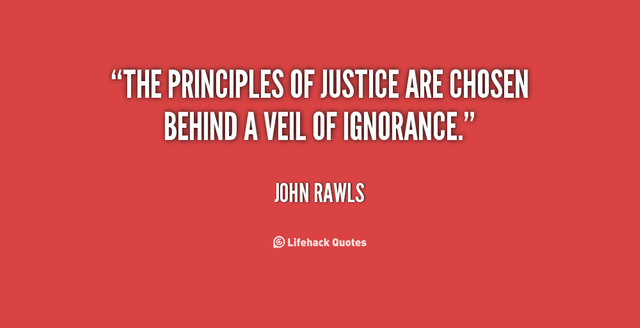Philosophy 101, #5: How can justice be reached from behind the 'veil of ignorance'?
The American philosopher, John Rawls, was concerned about justice and how we could reach consensus on the institutional framework of society that would make us live together prosperously and harmoniously. He understood that people hold different values - in his words: people hold different comprehensive doctrines of how life should be. According to Rawls, this consensus could be reached from behind 'the veil of ignorance'.
What is the veil of ignorance?
The veil of ignorance is a concept through which people reach an agreement on a particular social contract. According to Rawls, political philosophy should uncover political agreements among different-minded individuals in order to bring forth a well-ordered and fair society:
“[W]hat better alternative is there than an agreement between citizens themselves reached under conditions that are fair for all?"
People from behind the veil of ignorance are stripped of their personal comprehensive doctrines, and they are to regard themselves as ignorant of their status, wealth and power. Rawls puts it as follows,
“[N]o one knows his place in society, his class position or social status; nor does he know his fortune in the distribution of natural assets and abilities, his intelligence, strength, and the like."
In addition, they are to regard themselves as free and equal individuals who are all concerned with social justice. Rawls calls the position from behind the veil of ignorance ‘the original position’. Rawls acknowledges that his original position argument can only lead to stability if the people accept the principles and the required institutions that maintain the principles.
What are these principles?
Rawls asserts that people from the original position will agree on the following principles.
1. The equal liberty principle
This principle maintains that every person has the right to equal basic liberties such as the right to vote, the right to hold public office, freedom of speech, freedom from psychological and physical oppression etc.
In addition, if social inequalities among people arise, these inequalities must satisfy the following two principles.
2. The fair equality of opportunity princple
Fair equality of opportunity ensures that any individual with the same native talent and the same ambition has the same chances for competitive success.
3. The difference principle
The difference principle holds that social and economic inequalities must lead to the greatest benefit of the least advantaged.

A short critique of Rawls
Even though Rawls claims that his political philosophy is realist, one could object to his approach by stating that the original position is obviously idealistic. We could, as Raymond Geuss maintains, question what relevance an agreement reached in the original position would have to us,
“who do have concrete ‘identities’, parts of which sometimes can be of importance to us, and who live in a concrete situation in a complex real world, not in the idealized world of the original position”.
Or one could also argue that it is impossible and unrealistic to imagine ourselves without our social or historical experience. The people from behind the veil of ignorance may therefore have reasoned from the perspective of American liberals, which has eventuated in the structural arrangements that are similar to what currently exists in the United States.
Reference
Geuss, R. (2005). Outside Ethics.
Rawls, J. (2001). Justice as Fairness: A Restatement.
Nice article
Thank you, Lem!
Resteemed! Wow. You're very active in writing these days
Yes, I try to write two articles a day. :)
Great post! An interesting read, thanks for sharing.
Thank you for your comment!
Wow really cool. I am waiting to see others.
Thanks. Stay tuned, I will try to add more philosophical content on Steemit :)
I was just reading some theory yesterday from michio kaku physics of the impossible
Ah, that's a great book. It sparks our imagination of what is possible...
great philosophy, it is very fascinating how long people have been studying philosophy
Yeah, it's an interesting discipline. :D
I agree it is the best way to reach justice is to have everyone on a level playing field and that justice isn't obstructed or hindered by wealth or authority. In many countries the majority is the less advantaged and the best thing to do is give them a voice.
Nice post Chhaylin !
Thank you, Chantha! I appreciate your comment
Hmm, I'm not rich, but I'm in favor of the freedom to earn & enjoy the fruits of my efforts.
While I can certainly agree with Rawls' principles, I'm immediately pushed to ask the question, "Who decides?"
What is fair equality?
How do you determine the "greatest benefit" & who are the "least advantaged" and pardon the poor grammar, but, how much do you take from whom to give to the least advantaged?
Those are very good questions that, I think, we cannot decide on from behind the veil of ignorance. :)
"Fair equality of opportunity ensures that any individual with the same native talent and the same ambition has the same chances for competitive success."
"The difference principle holds that social and economic inequalities must lead to the greatest benefit of the least advantaged."
These two positions seems contradictory. How can you have equality of opportunity for "any individual with the same native talent" while simultaneously having "social and economic inequalities that must lead to the greatest benefit of the least advantaged"?
Would that not then, by definition, render the "least advantaged" with a greater "opportunity" than their merits would otherwise indicate, per the first principle?
That's a very good point! I agree :D